Cancer Treatment and Fertility: Information for People Assigned Female at Birth
Having a new diagnosis of cancer can be overwhelming. Patients may feel anxious and depressed. Many are concerned about how treatment may affect their plans to have a family someday. We are here to help you. It is important to understand the risks and options. Talk with your doctor or the oncofertility nurse navigator before you start treatment. This is the time when there may be more choices to preserve your fertility.
What is Fertility?
Fertility is the ability to conceive and have a child. People with ovaries are born with all the eggs (oocytes) they will ever have, about 1 million. These eggs are stored in their ovaries. Starting after puberty, every month a small group of eggs from the larger group begins to grow. One egg from this smaller group fully matures during the month. It is then released from an ovary. This process is known as ovulation.
If a sperm comes into contact with an egg when a person with ovaries is ovulating, the sperm can fertilize the released egg. This can result in the creation of an embryo and pregnancy. The other eggs growing that month break down and are cleared from the body. This is how eggs are lost gradually over the course of a lifetime. Eventually, there are so few eggs that pregnancy is not possible and menopause begins.
Cancer Treatment and Your Fertility
Sometimes- but not always- cancer treatment can impact the reproductive cycle. This affects your ability to get pregnant.
Chemotherapy
Some chemotherapy drugs destroy eggs. This causes a drop in estrogen levels and menstrual periods stop. Your risk depends on the drug you are taking, the dose given, and your age at the time of treatment.
Chemotherapy can affect you in one of two ways:
-
Temporary loss of periods. This means you will still have eggs left after treatment, and start getting your period again. However, you may develop infertility and menopause at a younger age.
-
Permanent loss of periods. The treatment could cause you to lose so many eggs that you will never get your period again. This means you are infertile and will begin menopause shortly after treatment. You may have symptoms such as hot flashes, vaginal dryness and night sweats.
Surgery
Some surgeries in your pelvic area can affect fertility. Surgery to the ovaries may destroy some eggs and make it harder to become pregnant. Surgery to the uterus can make it difficult or impossible to carry a pregnancy.
Radiation Therapy
Radiation to the pelvis or abdomen can destroy the eggs in your ovaries. The effects are much the same as when eggs are lost through being treated with chemotherapy.
Radiation to the uterus may also damage it. The risk depends on the dose and how much of the uterus is treated. After radiation treatment to the uterus, many patients may not be able to become pregnant or carry a baby to full term.
Radiation therapy to the area of the brain where the pituitary gland is located can interrupt the cycle of egg maturation and ovulation. It does not, however, destroy the eggs in the ovaries. This means that by using hormone medication in the future, many patients are able to become pregnant.
Other Treatments
You may need other treatments that could affect your reproductive system. These include hormone therapy, immunotherapy and targeted therapy. Your health care provider or the oncofertility nurse navigator can tell you more about the risks.
Preserving Fertility: What are Your Options?
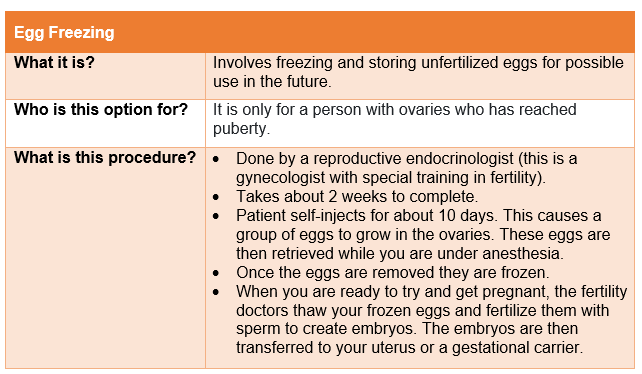
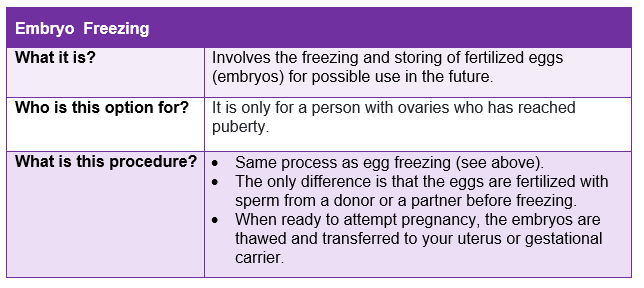
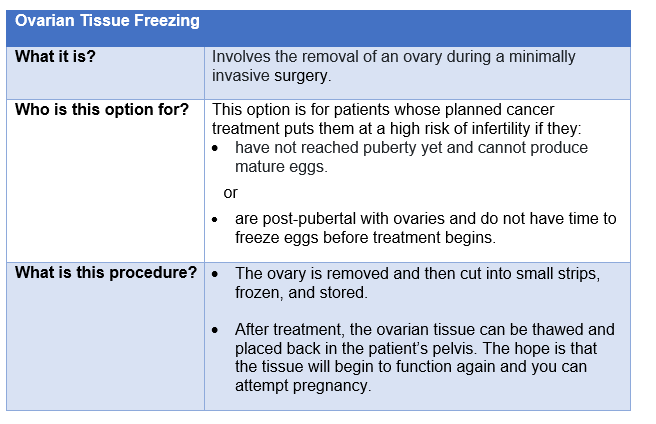
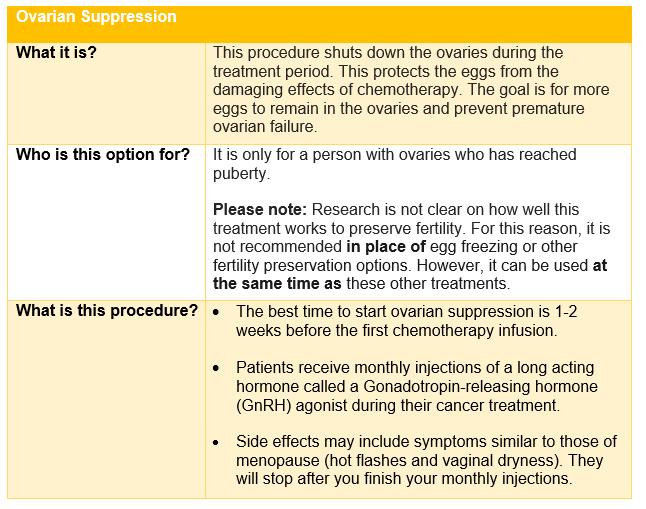
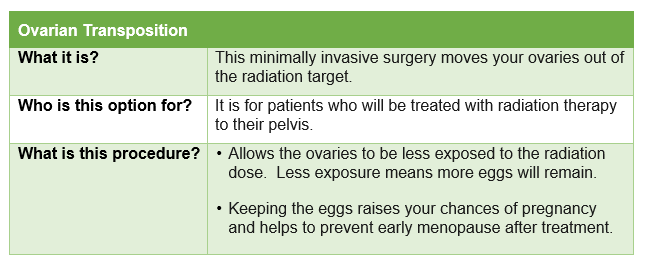
Fertility Sparing Options for Early Stage Gynecologic Cancers
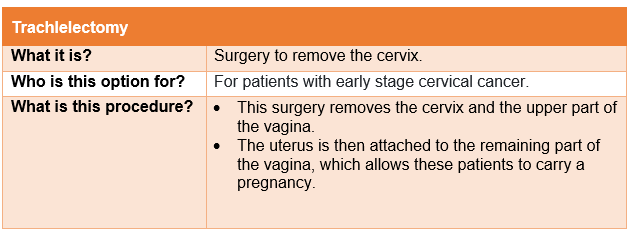


Questions to Consider
Not all cancer treatments will affect your ability to have children in the future. If you have concerns, some questions you might ask are:
-
What are the risks that my treatment might pose to my fertility?
-
What fertility preservation options are right for me?
-
Is there a reproductive specialist that I could see?
-
What are the costs?
Many people with a new diagnosis of cancer do not realize that the disease or its treatments may affect their fertility. Knowing your fertility risks and preservation options is important for decision making. It also helps to avoid regret and can provide a better quality of life in the future.
Additional Resources:
Alliance for Fertility Preservation
https://www.allianceforfertilitypreservation.org/options-for-women/
American Cancer Society (cancer.org) – Female Fertility and Cancer
www.cancer.org/treatment/treatments-and-side-effects/physical-side-effects/fertility-and-sexual-side-effects/fertility-and-females-with-cancer.html
The Oncofertility Consortium
www.savemyfertility.org
National Cancer Institute
https://www.cancer.gov/about-cancer/treatment/side-effects/fertility-women
©2024 NYU Langone Health. All rights reserved. Reviewed for health literacy. This information is not intended as a substitute for professional medical care. Always follow your health care provider's instructions.